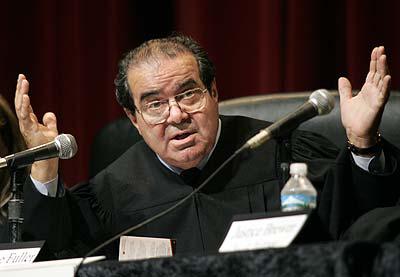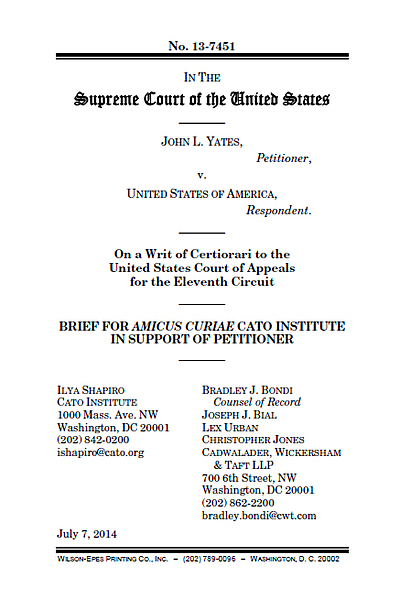



by Soma Sengupta

Does the Supreme Court’s recent decision in Bond v US, and its questions during oral arguments in Yates v US signal a new doctrine to strengthen judicial restraints on the combination of the vast reach and severity of federal criminal law and the breadth of prosecutorial discretion? As in the Court’s buildup to the Booker decision curbing the impact of the federal sentencing guidelines, the activity in these cases may presage a doctrinal revision by the Court as to statutory reach, as interpreted by prosecutors.
Bond v US
Carol Ann Bond, in a revenge plot against her husband’s paramour, applied toxic chemicals, some obtained from her chemical manufacturer employer, and some obtained online via Amazon, on the woman’s car, mailbox and door knobs in hopes that she would develop an uncomfortable rash. The victim suffered a minor thumb burn. Bond was charged with a violation of the Chemical Weapons Convention Implementation Act of 1998, a statute enacted to implement a treaty to combat terrorism and the use of weapons of mass destruction. Bond pleaded guilty, reserving her right to assert on appeal that the statute did not reach her conduct. The Supreme Court unanimously reversed her conviction.
The court found that the broad reach of the term “chemical weapon”, defined to include any chemical that “can cause death, temporary incapacitation or permanent harm to humans or animals”, rendered the statute ambiguous. Justice Roberts, writing for the majority, concluded that this broad definition did not “constitute a clear statement that
Congress meant the statute to reach local criminal conduct” and that the court would not accept a reading of a federal chemical weapons statute that would make a violator of a parent who “considers poisoning the [children’s gold]fish with a few drops of vinegar” and “[i]n sum, the global need to prevent chemical warfare does not require the Federal Government to reach into the kitchen cupboard or to treat a local assault with a chemical irritant as the deployment of a chemical weapon.”
As revelatory were the Chief Justice’s remarks while announcing the opinion. “The federal government decided literally to make a federal case out of it,” he said as chuckles sounded throughout the courtroom. In summarizing his opinion (for six justices), Roberts commented that accepting the federal government’s arguments might sweep in “detergents under the kitchen sink,” “stain removers in the laundry room,” and “drops of vinegar into the goldfish bowl” and that the “minor thumb burn” suffered by Bond’s target was “a two-bit local assault” and a matter for state law enforcement.
Yates v. US
John Yates had ordered his crew to throw 72 red grouper overboard after a Florida official (working on behalf of the federal government) determined that they were smaller than the legal limit. Yates was charged with, among other crimes, violation of 18 U.S.C. §1519, a felony punishable by up to twenty years’ imprisonment. Section 1519 was enacted as part of the Sarbanes-Oxley Act in the aftermath of the Enron scandal, passed to deal with what Congress saw as a profoundly serious problem of corporate fraud. Section 1519, titled “Destruction, alteration, or falsification of records in Federal investigations and bankruptcy,” was described in legislative reports as an “anti-shredding provision” and criminalized “knowing[ly] . . . destroy[ing] any record, document, or tangible object with the intent to impede, obstruct, or influence” a federal investigation, even one that has not yet been officially initiated. Yates was convicted and sentenced to 30 days imprisonment.
During oral arguments, the questions came hard and fast at Assistant Solicitor General Martinez. Justice Antonin Scalia noted that although Yates had only received a sentence of 30 days, he could have gotten 20 years, asking, “What kind of a mad prosecutor would…risk sending him up for 20 years?” and “Is this the same guy that brought the prosecution in Bond last term?” Justice Ruth Bader Ginsburg asked whether the Department of Justice gives federal prosecutors any guidance on what charges they should bring in a case like this. A similar statute, carrying only a five-year maximum sentence, would also apply to Yates’s case, she noted. Martinez’s response – that a manual instructs federal prosecutors to bring the charges that are most severe – drew this remark from Justice Scalia: “Well, if that’s going to be the Justice Department’s position, then we’re going to have to be much more careful about how extensive statutes are. I mean, if you’re saying we’re always going to prosecute the most severe, I’m going to be very careful about how severe I make statutes… Or how much coverage I give to severe statutes.” Mr. Martinez attempted to explain the Government’s view of the gravity of the crime, saying that Mr. Yates had disobeyed an express instruction by a law enforcement official to preserve evidence and concocted a convoluted cover-up. Justice Roberts responded “You make him sound like a mob boss or something. I mean, he was caught ” at which point he was interrupted by laughter. Roberts continued “The fish were how many inches short of permitted were the fish?” Mr. Martinez responded “The fish were it varied fish by fish, Your Honor”, drawing more laughter. In response to Mr. Martinez’ statement that the Government does not prosecute every fish disposal case, Justice Roberts commented “but the point is that you could, and the point is that once you can, every time you get somebody who is throwing fish overboard, you can go to him and say: Look, if we prosecute you you’re facing 20 years, so why don’t you plead to a year, or something like that. It’s an extraordinary leverage that the broadest interpretation of this statute would give Federal prosecutors.”
Justice Samuel Alito said that government counsel was “really asking the Court to swallow something that is pretty hard to swallow,” that a statute with a potential 20-year sentence could apply “in really trivial matters” and that Justice Department policy was that it “has to be applied in every one of those crazy little cases.” When government counsel explained that the policy to charge the most serious offense applies only once the decision is made to charge at all, Justice Anthony Kennedy responded that government counsel’s position nevertheless meant that the concept of prosecutorial discretion had no substance and that the Court perhaps should no longer defer to the concept of “prosecutorial discretion” if it was open to use as in this case. Justice Breyer ruminated on the possibility of 20 years punishment for kicking down an ember to disguise an illegal campfire, or for disposing an illegally picked flower in a state park.
Conclusion
If the Supreme Court is troubled by the unfettered exercise of prosecutorial discretion in the context of broad criminal statutes, it is not alone. Eighteen criminal law professors filed an amici brief in support of Yates, as did former congressman Michael G. Oxley, co-author of the Sarbanes-Oxley Act, the Chamber of Commerce, the National Association of Criminal Defense Lawyers, and many others. In 2013, Congress held hearings titled “Over-Criminalization of Conduct/Over-Federalization of Criminal Law”and “Reining in Overcriminalization”.
Much of the amici briefs urged a return to the doctrine of strict construction of criminal statutes, and Justice Scalia’s comments seem to endorse that view. In any event, the rein-in of unfettered prosecutorial discretion in interpreting broadly phrased statutes might be appearing, or re-appearing soon at a courtroom near you in New York. In December, the Second Circuit delivered a stunning rejection of Government insider trading theories in US v. Newman and Chiasson, theories that has been chugging along nicely and yielding, until recently, a perfect record of convictions. First, the Court, in ruling, stated “[t]he Government’s overreliance on our prior dicta merely highlights the doctrinal novelty of its recent insider trading prosecutions, which are increasingly targeted at remote tippees many levels removed from corporate insiders.” (Emphasis Added). Notice the phrase “its recent insider trading prosecutions.” Not “this case.” Moreover, the Court did not limit its analysis or holding to whether Newman or Chiasson knew of benefits received by tippers. It analyzed the term “benefit” and found “This standard, although permissive, does not suggest that the Government may prove the receipt of a personal benefit by the mere fact of a friendship, particularly of a casual or social nature. If that were true, and the Government was allowed to meet its burden by proving that two individuals were alumni of the same school or attended the same church, the personal benefit requirement would be a nullity. To the extent Dirks suggests that a personal benefit may be inferred from a personal relationship between the tipper and tippee, where the tippee’s trades “resemble trading by the insider himself followed by a gift of the profits to the recipient,” we hold that such an inference is impermissible in the absence of proof of a meaningfully close personal relationship that generates an exchange that is objective, consequential, and represents at least a potential gain of a pecuniary or similarly valuable nature. In other words, as Judge Walker noted in Jiau, this requires evidence of “a relationship between the insider and the recipient that suggests a quid pro quo from the latter, or an intention to benefit the [latter].””
See also the New York Court of Appeals: In People v. Golb, it found New York’s aggravated harassment statute unconstitutionally vague and overbroad, citing People v. Dietz for the proposition that “any proscription of pure speech must be sharply limited to words which, by their utterance alone, inflict injury or tend naturally to evoke immediate violence”. The prosecution had argued that any written communication that annoys, as long as annoyance is intended, constitutes violation of this criminal statute, even those via a third party. Judge Piggott asked “So if …you get some college kid who write – – – who e-mails the girlfriend of his roommate saying, you know, he really is a useless person. Is that aggravated harassment with respect to the victim?” ADA Rivellese of the NYDA asserted that it was. The Court ruled “[t]he statute criminalizes, in broad strokes, any communication that has the intent to annoy. Like the harassment statute at issue in Dietze, no fair reading of this statute’s unqualified terms supports or even suggests the constitutionally necessary limitations on its scope.” Moreover, the Court rejected the prosecution’s argument that violating terms of use of a computer constitutes violation of Penal Code §156.05, which criminalizes the knowing use of a computer without authorization. During oral arguments, Judge Smith asked whether the prosecution’s definition of the reach of this statute encompassed accessing Facebook via an office computer where employees are not permitted to access Facebook. ADA Rivellese asserted that it did. The Court vacated Mr. Golb’s conviction on this count.
These examples are not exhaustive.
